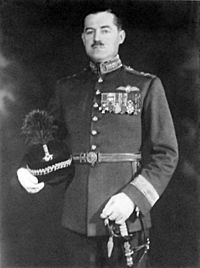John Tremayne Babington facts for kids
Quick facts for kids
Sir John Tremayne Babington
|
|
|---|---|

Air Commodore Babington
|
|
| Born | 20 July 1891 |
| Died | 20 March 1979 (aged 87) |
| Allegiance | United Kingdom |
| Service/ |
Royal Navy (1908–18) Royal Air Force (1918–44) |
| Years of service | 1908–44 |
| Rank | Air Marshal |
| Commands held | Technical Training Command (1941–43) Far East Command (1938–41) No. 24 Group (1936–38) RAF Halton (1934–36) RAF Gosport (1927–28) No. 7 Squadron RNAS (1917–19) |
| Battles/wars | First World War Second World War |
| Awards | Knight Commander of the Order of the Bath Commander of the Order of the British Empire Distinguished Service Order Mentioned in Despatches Knight of the Legion of Honour (France) Croix de guerre (France) |
Sir John Tremayne Babington (born July 20, 1891 – died March 20, 1979) was a very important leader in the Royal Air Force (RAF). He reached the high rank of Air Marshal. After he retired in 1944, he changed his last name to Tremayne. This was his mother's maiden name. He did this so people wouldn't mix him up with his younger brother, Philip Babington.
Sir John went to special schools for the Royal Navy. He studied at Osborne and Dartmouth Royal Navy colleges.
Contents
His Military Career
Sir John Babington started his military journey in 1908. He joined the Royal Navy as a Midshipman. This is a junior officer rank.
Serving in World War I
During the First World War, Sir John was part of the Royal Naval Air Service. This was the air branch of the Navy. He took part in an important air raid on November 21, 1914. This raid targeted the Friedrichshaven Airship Factory in Germany. This factory made large airships called Zeppelins.
Joining the Royal Air Force
After the war, on January 2, 1920, Sir John left the Navy. He then joined the newly formed Royal Air Force permanently. He quickly took on many leadership roles.
Key Commands and Roles
- In 1927, he became the Station Commander at RAF Gosport. This meant he was in charge of that air force base.
- In January 1929, he became a Station Commander in Iraq.
- Later that year, in November 1929, he became the British Air Representative. He worked with the League of Nations. This was an organization that tried to keep peace between countries.
- From 1934, he was in charge of RAF Halton. He also led the No. 1 School of Technical Training. This school taught people how to fix and maintain aircraft.
- In 1936, he became the Air Officer Commanding No. 24 Group.
- By 1938, he was the Air Officer Commanding for the RAF Far East Command. This was a very important role in Asia.
World War II Service
Sir John also served during the Second World War. From 1941 to 1943, he was the Air Officer Commanding-in-Chief of RAF Technical Training Command. This meant he was in charge of all technical training for the RAF. After this, he became the Head of the RAF Mission in Moscow. He retired from the RAF in 1944.
Life After Retirement
After leaving the military, Sir John continued to serve his country. He held the position of High Sheriff of Cornwall. This is an old and respected role in England.
More Information
- Air Marshal Sir John Tremayne/Babington
| Military offices
|
||
|---|---|---|
| Preceded by Norman MacEwen |
Commandant No. 1 School of Technical Training 1934–1936 |
Succeeded by Ranald Reid |
| Preceded by Sir William Welsh |
Air Officer Commanding-in-Chief Technical Training Command 1941–1943 |
Succeeded by Sir Arthur Barratt |
 | James Van Der Zee |
 | Alma Thomas |
 | Ellis Wilson |
 | Margaret Taylor-Burroughs |

